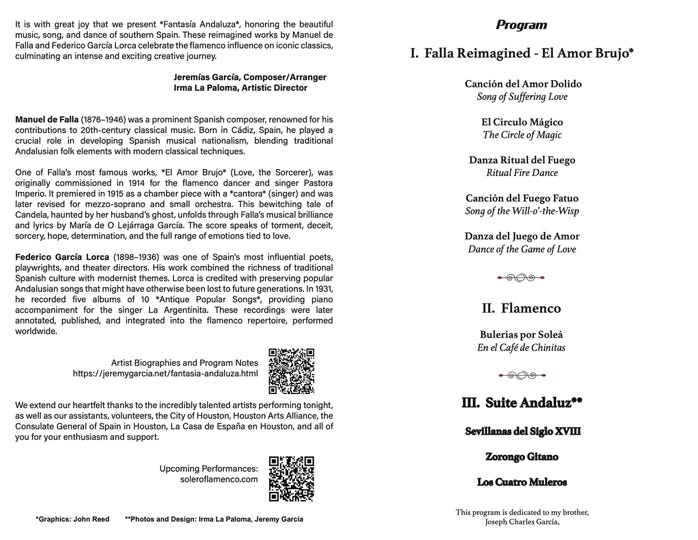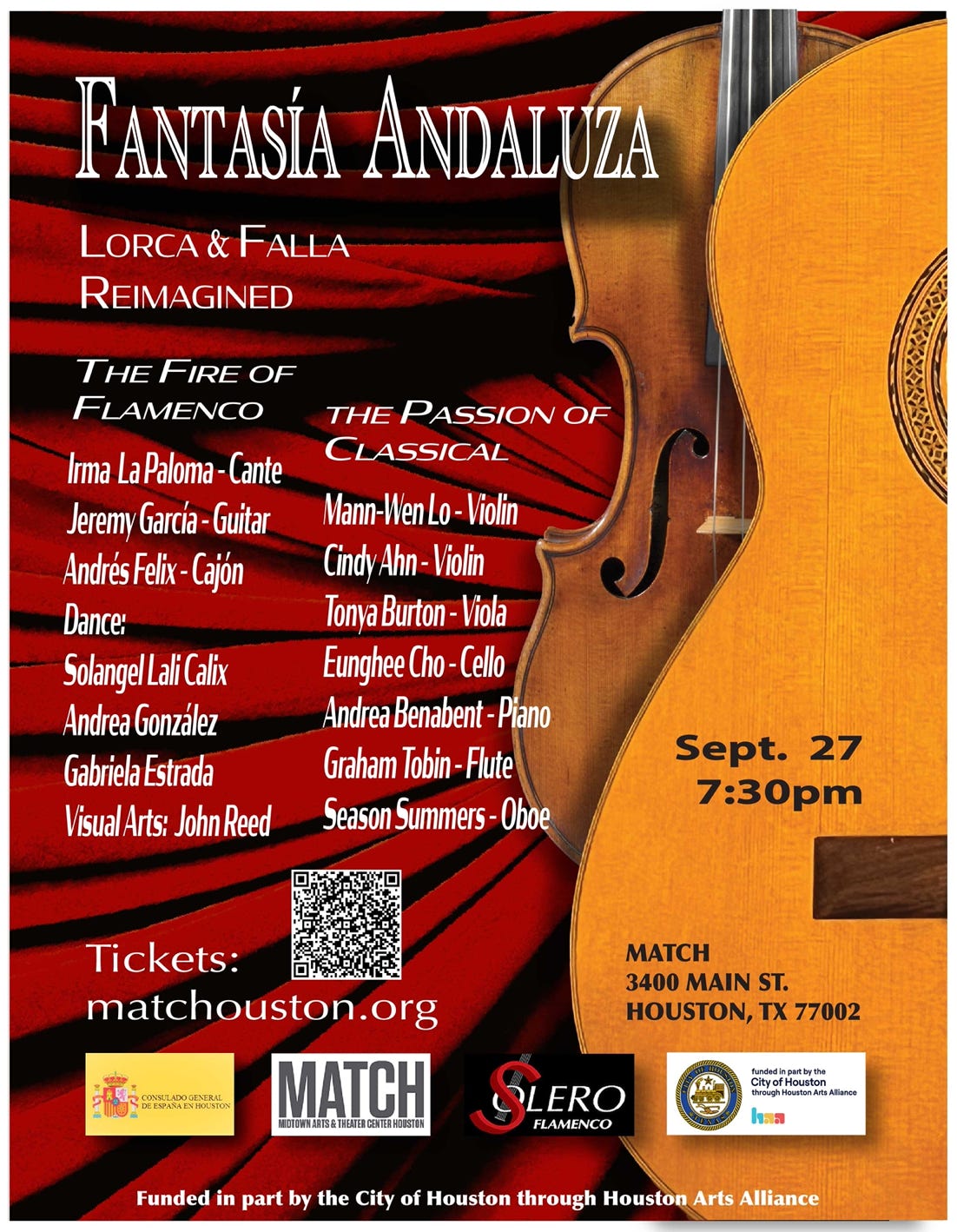Fantasía Andaluz
Digital program and Program Notes

Fantasía Andaluza
Program Notes
By Irma La Paloma
I. El Amor Brujo
1. Canción del Amor Dolido, Song of Suffering Love
Candela is in turmoil as she is haunted by her husband’s ghost. She has heard rumors of his infidelities. She feels loss, sadness, doubt, anger, betrayal.
“When the fire burns,
when the river roars,
if water does not kill the fire,
suffering condemns me,
love poisons me,
sorrow kills me."
2. El Círculo Mágico, The Circle of Magic,
Romance del Pescador, Romance of the Fisherman
Dancer: Cecilia Luna-Garza
Choreography: Gabriela Estrada Collage
Despaired by her troubled heart Candela walks by the river when she sees a fisherman. He sings, “I don’t want to catch fish, I wish to find a heart that I have lost.”
Candela speaks to him, “You have lost a heart, mine is being robbed by betrayal.”
The water rises when hearing of the lovers’ heartache and directs them to a cave where a witch will provide a remedy, thereby giving them hope that they will find love again.
3. Danza Ritual del Fuego, Ritual Fire Dance
Dancers: Solangel Lali Calix, Andrea González, Gabriela Estrada
Choreography: González, Estrada, Calix, La Paloma,
Candela has found new love in Carmelo, but must first free herself from her husband’s haunting. She performs the Ritual Fire Dance, summoning his spirit and enticing him to seek Lucía, his former lover. The music is bewitching, the tension rises as Candela dances around the fire in a trance. Much like an exorcism, she hopes to be rid her husband’s influence on her soul forever.
4. Canción del Fuego Fatuo, Song of the Will-o’-the-Wisp
"In folklore, a will-o'-the-wisp, will-o'-wisp, or ignis fatuus (Latin for 'foolish flame'; (ignes fatui), is an atmospheric ghost light seen by travelers at night, especially over bogs, swamps or marshes."
Candela sings…
”The same as the will-o’-the-wisp, such is love,
You run from it, and it follows,
you summon it, and it runs.
Damned are the black eyes that managed to see it,
damned is the sad heart that in its flame wished to burn,
just as the will-o’-the-wisp, love vanishes.”
5. Danza del Juego de Amor, Dance of the Game of Love
Candela faces her husband’s spirit, she reveals her knowledge of his betrayal and condemns him as evil and undeserving of her love.
This is a pivotal point in the story. Candela realizes that there is no amount of sorcery that will free her from the turmoil. She realizes that like her name, (candela means fire), SHE is the fire, she finds her inner strength, only she can depart from her past, determine her destiny, and love again.
She admonishes the spirit…
”Don't come near, do not look at me,
I am a consummated sorceress,
he who dares to touch me,
will burn his hand.”
I am the voice of your destiny!
I am the fire that consumes you!
I am the wind in which you sigh!
I am the sea in which you capsize!
II. Café de Chinitas
Dancer: Andrea González
In Café de Chinitas, Lorca captures the spirit of daily life in Andalucia and of the special relationship between two brothers. Paquiro and Frasculo are sitting in the Café when suddenly Paquiro tells his brother, I am braver than you, a better bullfighter and gypsy. He then promises to prove it by claiming victory over a nearby bull before the clock reaches the hour of 4:30pm. The story ends when the two brothers leave the café and……
En el café de Chinitas
dijo Paquiro a su hermano:
«Soy más valiente que tú,
más torero y más gitano.
III. Suite Andaluz
Federico García Lorca is credited with conserving popular Andalusian songs that would have been lost for future generations. In 1931 he made 5 vinyl recordings of his arrangements of 10 "Antique Popular Songs." He provided the piano accompaniment for singer La Argentinita. These archival recordings would later be annotated, catalogued, published, incorporated into the flamenco repertoire, and performed all over the world.
1. Sevillanas del Siglo XVIII
Dancers: Solangel Lali Calix, Andrea González,
Gabriela Estrada
"!Viva Sevilla, viva Sevilla!" And ode to the capital of Andalucía, the lyrics speak of the beauty and spirit of Sevilla, her inhabitants, of the beautiful face of La Macarena, patron saint of the Romani, of the breathtaking sight of the Río de Sevilla filled with white sails.
Sevillanas are a folkloric dance derived from the Seguidilla Manchega which acquired flamenco traits and to date is performed with song, guitar, dance, and often castanets. It is the most popular dance in southern Spain’s festivals, romerías, and gatherings.
2. Zorongo Gitano
The Zorongo presents the contrast between the excitement of youth and the wisdom acquired with the passing of time. The result is the conviction that what is most important is to love and be loved.
“The moon is a shallow well, flowers have no worth,
that which is of worth are your arms that embrace me in the night.”
3. Los Cuatro Muleros (The Four Muleteers)
One of the most recognized antique popular songs of Andalucía, Los Cuatro Muleros (The Four Muleteers) enchants with its catchy melody, thus it has been used in military and political campaigns. The original version is in the voice of a young woman who points out to her dear mother that one of the four mules men is her betrothed. Satirical and whimsical, it can be interpreted as her fantasizing of a romance from afar or revealing a secret love.
“Of the four mules men that go to the river,
the one with the spotted mule is my betrothed.”
Notes by Irma La Paloma
September 27, 2024. 7:30p
FANTASÍA ANDALUZA
LORCA AND FALLA REIMAGINED
The Fire and Passion of Flamenco and Classical: A Love Story and Songs of Andalucía
Fantasía Andaluza, composed and arranged by Jeremy García of Solero Flamenco, ignites the fire and passion of Flamenco and Classical in an exciting new view to iconic classics. Top Houston musicians, a flamenco singer, guitarist, and dancers bring to life re-imagined excerpts from Manuel de Falla’s “El Amor Brujo” (Love, the Sorcerer) and the newly composed “Suite Andaluz.” Enjoy the pairing of Flamenco and Chamber ensembles in the full splendor of the music of Spain!
García celebrates the flamenco influence in "El Amor Brujo” while maintaining the integrity of De Falla’s classical vision. He returns to the root of De Falla’s inspiration by incorporating guitar, compás (rhythm), and original interludes to the classical phrasing. His deliberate orchestration for a small ensemble parallels the intimacy of flamenco tablao (performance). Flamenco song, music, dance, and a classical chamber ensemble unveil the drama and passion of this version of the legendary story of bewitched love.
Flamenco singer (cantaora) Irma La Paloma, will be the voice of “Candela,” the main character in the storyline of “El Amor Brujo.” Her powerful voice unites organic flamenco vocals with the finesse of classical song. “I am honored and excited to sing selections of this music that much like the love story, haunts and impassions. I am equally thrilled to be the voice of a woman who finds her inner strength and takes charge of her destiny.”
"Suite Andaluz” features new music composed by García in re-imagined selections of antique popular songs recorded by Federico García Lorca and La Argentinita in 1931. Lyrics that exalt the beauty of Seville and life and love in Andalucía, accompanied by entrancing violin melodies and crisp castanets will transport audiences to the south of Spain.
García was awarded a Support for Artists and Creative Individuals Grant from the City of Houston through the Houston Arts Alliance. “This project grew out of an organic process in collaboration with Irma La Paloma. The exploration of this repertoire led to the development of an intrinsic relationship with the songs, the stories, the passion and the energy. The resulting work has been years in the making and represents our humble desire to share our vision of these timeless classics. It is a dream come true to present this work in the company of outstanding artists,” he stated.
The full cast of artists features some of Houston's top professional musicians:
Irma La Paloma - Cante (Vocals) & Artistic Direction
Jeremy García - Guitar & Music Direction
Mann-Wen Lo - Violin
Cindy Ahn - Violin
Tonya Burton - Viola
Eunghee Cho - Cello
Andrea Benabent - Piano
Graham Tobin - Flute
Season Summers - Oboe
Andrés Felix - Cajón
Dance:
Solangel Lali Calix
Andrea González
Gabriela Estrada
Composed/Arranged by Jeremy García, Artistic Director, Irma La Paloma.
This program is funded in part by the City of Houston through Houston Arts Alliance.

This program is funded in part by the City of Houston through Houston Arts Alliance.
Meet the Artists
Click the Photo
Scroll down for Bio
Jeremy García
Guitar
Composer/Arranger
Irma La Paloma
Cante
Artistic Director
Mann-Wen Lo
Violin
Cindy Ahn
Violin
Tonya Burton
Viola
Eunghee Cho:
Cello
Graham Tobin
Flute
Season Summers Oboe
Andrea Benabent Piano
Andrés Felix
Cajón
Solangel Lali Calix
Baile
Andrea González
Baile
Gabriela Estrada
Baile
John Reed
Artist
Cecila Garza-Luna
Dance